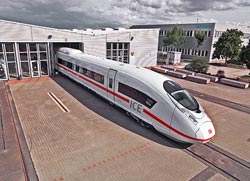ICE trains for Deutsche Bahn approved for Germany

Siemens high-speed Velaro D Train<br>
The new ICE trainsets from Siemens for Deutsche Bahn (DB) have been approved for immediate deployment in Germany. The German Federal Railway Authority (EBA) approved the trains' operation – also in multiple-unit or so-called double-traction mode – on DB's rail network.
Two trains were delivered in November for test purposes. Siemens has now supplied DB with two more ICE trains of the Velaro D type for deployment in Germany, with four additional trains to follow in the spring of 2014.
“With the approval to operate these trains in Germany now granted, we've reached an important milestone in this project,” said Jochen Eickholt, CEO of Siemens' Rail Systems Division. As agreed with DB, the remaining eight of the 16 ICE trains originally ordered are reserved for test runs in Belgium and France in preparation for implementing cross-border operation and obtaining the requisite authorizations.
Since 2008, DB has ordered from Siemens a total of 16 advanced high-speed trains, worth more than €500 million, for deployment in Germany, Belgium and France. Following their approval by the EBA, the new ICE trains can now go into operation on Germany's rail network. The approval process for their cross-border deployment to Belgium and France is still underway. The regulations regarding train control systems – for example, those regarding the correct interpretation of route signals – vary in Europe from country to country. The related complexity is the main reason for the delivery delays.
“We're cooperating with Deutsche Bahn, the French operator SNCF, the German Federal Railway Authority and the corresponding French and Belgian authorities to obtain approval – which has not yet been granted – for the trains' cross-border deployment. However, we're also dependent in this connection on a number of suppliers. In order to accelerate these processes in the future, we have to achieve harmonization with respect to technology and approval in Europe as quickly as possible,” stated Eickholt.
The Velaro D is a further development of the current ICE 3 trains, several of which have already been deployed in cross-border operation between Germany, France and Belgium since 2007. Each new train comprises eight individual cars and can accommodate up to 460 passengers – 30 more than its predecessor. With an output of 8,000 kilowatts (about 11,000 hp), the train can achieve speeds of up to 320 kilometers per hour (km/h). Like earlier models, the new ICE has traction motors that are mounted under the floor and distributed over the length of the train, enabling particularly rapid acceleration. The climate-friendly electric brake system feeds braking energy directly back into the power supply system.
Siemens AG (Berlin and Munich) is a global powerhouse in electronics and electrical engineering, operating in the fields of industry, energy and healthcare as well as providing infrastructure solutions, primarily for cities and metropolitan areas. For over 165 years, Siemens has stood for technological excellence, innovation, quality, reliability and internationality. The company is one of the world's largest providers of environmental technologies. Around 43 percent of its total revenue stems from green products and solutions. In fiscal 2013, which ended on September 30, 2013, revenue from continuing operations totaled €75.9 billion and income from continuing operations €4.2 billion. At the end of September 2013, Siemens had around 362,000 employees worldwide on the basis of continuing operations. Further information is available on the Internet at: http://www.siemens.com.
The Siemens Infrastructure & Cities Sector (Munich, Germany), with approximately 90,000 employees, focuses on sustainable technologies for metropolitan areas and their infrastructures. Its offering includes products, systems and solutions for intelligent traffic management, rail-bound transportation, smart grids, energy efficient buildings, and safety and security. The Sector comprises the divisions Building Technologies, Low and Medium Voltage, Mobility and Logistics, Rail Systems and Smart Grid. For more information, visit http://www.siemens.com/infrastructure-cities
The Siemens Rail Systems Division (Berlin, Germany) is an international leader in providing rolling stock and related services. Its portfolio covers the full range of vehicles – from railroad cars to metros and locomotives to trams and light-rail vehicles. The Division combines competence in the areas of local, long-distance, and logistical transport to offer comprehensive expertise for environmentally friendly, efficient, and reliable rail vehicles, which are already in use in more than 40 countries. For more information, visit http://www.siemens.com/rail-systems
Reference Number: AXX20131215e
Contact
Ms. Ivonne Junghänel
Siemens AG
Wittelsbacherplatz 2
80333 Munich
Germany
Tel: +49 (89) 636-33929
ivonne.junghaenel@siemens.com
Ms. Uta Apel
Infrastructure & Cities Sector
Siemens AG
Wittelsbacherplatz 2
80333 München
Germany
Tel: +49 (174) 2459332
uta.apel@siemens.com
Mr. Peter Gottal
Rail Systems Division
Siemens AG
Nonnendammallee 101
13629 Berlin
Germany
Tel: +49 (30) 386-20280
peter.gottal@siemens.com
Media Contact
More Information:
http://www.siemens.com/press/ICEAll latest news from the category: Corporate News
Newest articles

Parallel Paths: Understanding Malaria Resistance in Chimpanzees and Humans
The closest relatives of humans adapt genetically to habitats and infections Survival of the Fittest: Genetic Adaptations Uncovered in Chimpanzees Görlitz, 10.01.2025. Chimpanzees have genetic adaptations that help them survive…

You are What You Eat—Stanford Study Links Fiber to Anti-Cancer Gene Modulation
The Fiber Gap: A Growing Concern in American Diets Fiber is well known to be an important part of a healthy diet, yet less than 10% of Americans eat the minimum recommended…

Trust Your Gut—RNA-Protein Discovery for Better Immunity
HIRI researchers uncover control mechanisms of polysaccharide utilization in Bacteroides thetaiotaomicron. Researchers at the Helmholtz Institute for RNA-based Infection Research (HIRI) and the Julius-Maximilians-Universität (JMU) in Würzburg have identified a…



